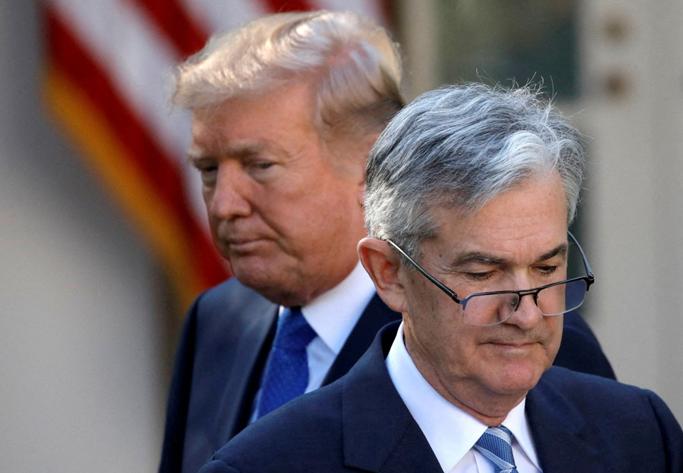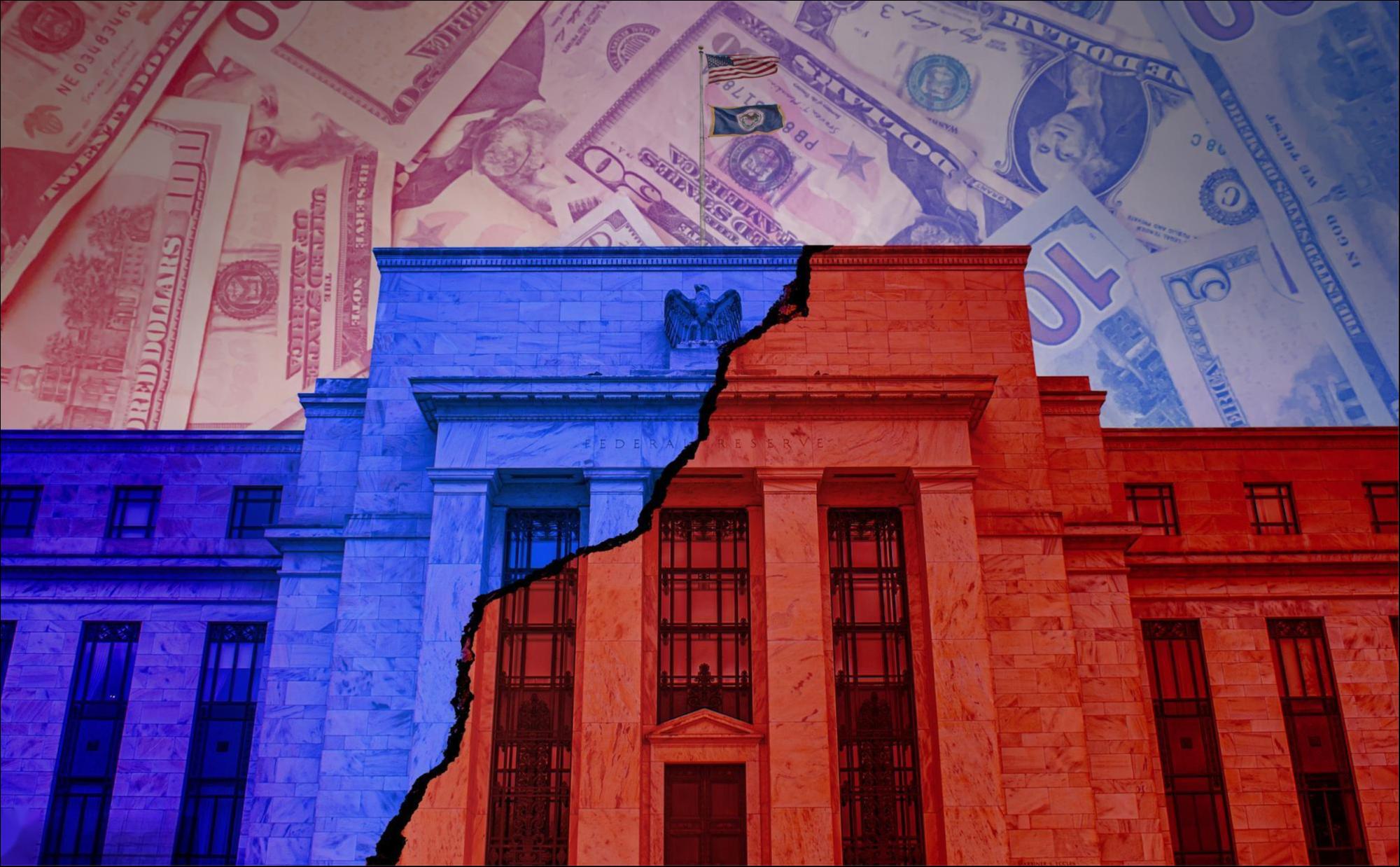
On June 30, 2025, US President Trump once again launched a dramatic attack on Federal Reserve Chairman Powell. He not only publicly lambasted Powell on social media but also pushed his call for interest rate cuts into the spotlight through a handwritten annotation on an interest rate comparison chart. This years-long "interest rate tug-of-war" not only exposes the deep-seated contradictions in US political and economic decision-making but also serves as a typical case for the global observation of the risks of political interference in the economy.
I. Handwritten Annotation: A Well-Crafted Political Performance
Trump's pressure tactics are highly characteristic of his personal style. He annotated the chart in his signature uppercase letters: "Jerome (Powell), you are, as always, 'too late'. You have cost the US dearly - and continue to do so - you should cut interest rates significantly!" In the chart, the US federal funds rate, ranging from 4.25% to 4.50%, ranks among the highest among major central banks globally, far exceeding the "ideal rate" of 1.75% set by Trump. White House Press Secretary Caroline Leavitt displayed the chart at a press conference, defining it as "the president's angry accusation of the Federal Reserve's inaction."
This combination of "handwritten annotation + chart comparison" is actually a continuation of Trump's political strategy. Since appointing Powell as Federal Reserve Chairman in 2018, Trump has never concealed his dissatisfaction with the high-interest-rate policy. He has repeatedly called Powell a "fool" and a "dummy" in public and even threatened to remove him from office. This time, choosing to exert pressure simultaneously on social media and at a press conference is not only a direct response to the Federal Reserve's decision to maintain interest rates unchanged at its June policy meeting but also a move to build momentum for upcoming political maneuvers. The Trump administration is considering appointing the next Federal Reserve Chairman ahead of schedule, attempting to force a policy shift through personnel changes.
II. Call for Interest Rate Cuts: The Intertwining of Economic Logic and Political Calculations
Trump's obsession with interest rate cuts essentially reflects a conflict between political goals and economic realities. From an economic perspective, he aims to offset the side effects of tariff policies through interest rate cuts. In the first half of 2025, the Trump administration imposed tariffs on imported goods, leading to an increase in US import costs and exacerbating inflationary pressures. The Federal Reserve chose to maintain high interest rates to curb inflation, but Trump believes that rate cuts can reduce corporate financing costs, stimulate investment and consumption, and thus "offset" the negative impact of tariffs on the economy.
However, this logic has a fatal flaw. Federal Reserve Chairman Powell clearly pointed out that tariff policies could trigger "stagflation" - a combination of stagnant economic growth and high inflation. If interest rates are cut at this time, although it may briefly stimulate demand, it will further drive up prices, creating a vicious cycle. In fact, the US core inflation rate rose to 3.2% in June 2025, well above the Federal Reserve's 2% target. Powell emphasized at a congressional hearing: "The Federal Reserve's responsibility is to maintain long-term price stability, not to cater to short-term political demands."
From a political standpoint, Trump's pressure is more like a "scapegoating" performance. As the risk of a US economic recession rises, he blames the Federal Reserve's "inaction" to divert public attention from the mistakes in tariff policies. The Associated Press analysis points out that Trump's frequent attacks on Powell are aimed at preparing a "scapegoat" for a potential future economic crisis. If inflation gets out of control or the unemployment rate rises, he can claim that "it's all because Powell refused to cut interest rates."
III. Institutional Game: The Dilemma of Balancing Independence and Accountability
Trump's pressure tactics have put the independence of the Federal Reserve in the spotlight. As the central bank of the United States, the Federal Reserve is theoretically independent of the executive branch, and its monetary policy decisions should be based on economic data rather than political pressure. However, Trump's continuous attacks have substantially undermined the Federal Reserve's authority. European Central Bank President Christine Lagarde publicly called for applause for Powell, saying that he "embodies the standard of a brave central bank governor," which indirectly reflects the international community's concerns about US political interference in the economy.
The deep-seated contradiction in this game lies in how to balance the independence of monetary policy with the government's economic accountability. Trump's supporters argue that as a public institution, the Federal Reserve should be accountable to the president's economic policy goals. In contrast, opponents emphasize that independence is the cornerstone for the central bank to effectively fulfill its responsibilities, and political interference will lead to short-sighted monetary policies, ultimately harming the long-term health of the economy.
IV. Global Implications: The Boundaries and Costs of Political Interference in the Economy
Trump's case provides profound lessons for the world. Political interference in the economy may bring three major risks: First, it can disrupt market expectations of monetary policy, triggering asset price volatility. Second, it can weaken the central bank's ability to combat inflation, leading the economy into a "high inflation - low growth" trap. Third, it can damage a country's creditworthiness and reduce international investor confidence. In June 2025, the yield on the 10-year US Treasury bond fluctuated sharply due to expectations of interest rate cuts, and the US dollar index fell by 1.2% in a single week, which were direct market reactions to the risks of political interference.
The more fundamental issue is that when political leaders treat economic policies as tools, economic decisions may become pawns in power games. Trump's "handwritten annotation" may briefly attract attention but cannot change economic laws. History shows that political interference that forcibly distorts market signals will ultimately come at a higher cost.
V. The Dual Task of Returning to Rationality and Institutions
The "interest rate war" between Trump and Powell is essentially a confrontation between political short-termism and economic long-termism. To prevent such conflicts from recurring, efforts need to be made in two aspects: On the one hand, strengthen the mechanisms to safeguard the independence of central banks and clarify the boundaries of political interference through laws. On the other hand, enhance the economic literacy of political leaders so that they understand the dialectical relationship between "professional decision-making" and "political accountability." Only in this way can economic policies truly serve the public interest rather than becoming sacrifices in power games.

Recently, US Treasury Secretary Mnuchin publicly stated that the selection process for the next chair of the Federal Reserve has been initiated.
Recently, US Treasury Secretary Mnuchin publicly stated tha…
At the dawn of 2026, the United States launched a military …
From the stiff step when it first debuted in 2022 to demons…
"On the early morning of January3,2026, the United States l…
"We absolutely need Greenland," Trump's straightforward sta…
On January 3rd, the US Special Forces launched a surprise a…